Nominations for the WRI Council elections, July 2014
Elections for WRI Council will take place in Cape Town. The following people have been nominated as individually elected Council members:
Carlos Barranco, state of Spain // Albert Beale, Britain // Pelao Carvallo, Paraguay/Chile // Jungmin Choi, Korea // Estefanía Gómez Vásquez, Colombia // Daniel Jakopovich, Croatia/United Kingdom // Cattis Laska, Sweden // Subhash Chandra Kattel, Nepal // Moses John, South Sudan // Nozizwe Madlala-Routledge, South Africa // Lexys Rendón, Venezuela // Rosa Biwangko Moiwend, West Papua // Miles Rutendo Tanhira, Zimbabwe/Sweden // Sergeiy Sandler, Israel // Igor Seke, Serbia/Mexico // Hülya Üçpinar, Turkey // Stellan Vinthagen, Sweden
Read 'What does it mean to be a WRI Council member?' here.
1. Carlos Barranco, state of Spain
Email: bilaben [at] gmx.net
Nominated by Peace Action (Macedonia)
My name is Carlos Pérez Barranco and I was born in Madrid in 1969, although I have spent most of my life in Valencia. I currently work as a translator in audio-visuals. I graduated in physics in 1992 in Barcelona, where I first came into contact with grass-roots movements. I worked with environmental groups and started to experience the culture of direct democracy (popular assemblies) and direct nonviolent action. But it wasn’t until a couple of years later that I became more fully involved, as I learnt more about the work of the Movement for Conscientious Objection (MOC in its Spanish acronym) and the campaign for total refusal to serve in the army (insumisión), and shortly after took the leap into civil disobedience to conscription. In 1996 I joined the Valencia MOC group and took part in a new form of total refusal, called “insumisión in the barracks”, which consisted of publically deserting, once in the barracks as a recruit. The following years – in which I spent 21 months in a military prison together with another 30 insumisos-deserters – became a life-changing and political experience of great significance to me, a period rich in political learning around self-organizing, direct democracy, grass-roots campaigning, direct nonviolent action and civil disobedience. Since the collapse and abolition of conscription in 2001, I have remained very active in the MOC network, trying to contribute analysis and proposals during the transition towards a post-insumisión antimilitarist movement, e.g. facilitating greater coordination and participation of MOC in peacemaking and antimilitarist networks throughout Europe.
At the 2010 WRI conference in Ahmedabad (India) I was elected to the Council as an individual member. These past years I have collaborated regularly as a translator into Spanish with various WRI publications, like the book A Conscientious Objector’s Guide to the International Human Rights System. In the last three years I have mainly focused on facilitating workshops and trainings in nonviolence and civil disobedience. The new social and political climate that arose in Spain out of the 15M movement in 2011 has led to a dramatic increase in interest in active nonviolence and civil disobedience and demand for training in these topics. Through these workshops we have distributed quite a number of WRI materials, including the WRI Handbook for Nonviolent Campaigns. I recently participated in the facilitating team for the trainers’ training in nonviolent action that took place in Quito (Ecuador) last March, co-organized by WRI and Serpaj-Ecuador.
I hope that my work in the WRI Council will continue to strengthen the links between the Spanish antimilitarist movement and WRI and that these links will go both ways. The historic tradition of WRI and the huge reach of its network will strengthen the Spanish movement, while the Spanish anti-militarism movement will add its perspective to WRI.
2. Albert Beale, Britain
Email: worldpeace [at] gn.apc.org
Nominated by Institut für Friedensarbeit und Gewaltfreie Konfliktaustragung and Peace Pledge Union
I became a pacifist at school, on a day when someone was hanged "to show that killing people was wrong". But at the time I didn't know there was a name for that viewpoint.
In the "real world", after studying mathematics and physics (and much else) at university (where I also discovered the joys of swimming in the English Channel in every month of the year), I worked as a computer programmer and as a physics teacher. In the peace movement my past jobs have included co-ordinator of the (British) Campaign Against Arms Trade (which I co-founded), and many years as co-editor of Peace News.
I have campaigned actively against militarism (including with particular reference to Northern Ireland and the Middle East), as well as over public transport, cycling, nuclear power, censorship and free speech, the rights of women and of sexual minorities, housing, local democracy, public services and privatisation, and environmental issues including over-consumption. My campaigning has encompassed everything from writing, and talking politely (and occasionally impolitely) to government ministers, through to non-violent direct action and sometimes nonviolent direct action; I have been involved in a number of political trials, both criminal and civil.
I currently edit the Housmans World Peace Database & Directory; I have voluntary roles in the Peace Pledge Union (as a media spokesperson) and for Peace News Trustees, and I am the volunteer editor of the Peace Diary published by Housmans Bookshop; I continue to be active over many of the issues listed above.
I have served previously on the WRI Council - both as PPU representative, and as an internationally-elected member.
When on the WRI Council, I have tried to be active and supportive (though without avoiding necessary debates and arguments) in discussions and meetings, and personally with regard to the WRI office (which is in the building I work in). I am extremely committed to international work, considering it important to use the strength of the existing WRI network to support colleagues in countries where the WRI connection, and awareness of the WRI, is weaker - but this must be done without diluting the core principles which give the WRI its raison d'etre.
We must also help the establishment and development of war resistance organisations in countries without any current WRI affiliates. I am committed to building links between the traditional WRI constituency and campaigners in other fields who are discovering/using nonviolence.
My commitment to pacifism and nonviolence is closely related to my opposition to nationalism (without exception) and to my atheism; indeed, I make little distinction between being described as a "militant pacifist" and a "born-again atheist" - for me they are simply different expressions of the same underlying principles.
Attributes I would bring to the Council include my literacy and numeracy and rationality, my willingness to say things I think need saying rather than opting for a quiet life, my long experience of WRI, and also my experience of serving co-operatively on management bodies.
3. Pelao Carvallo, Paraguay/Chile
Email: pelaocarb [at] gmail.com
Nominated for Vredesbeweging PAIS
I'm Pelao Carvallo, Latin American antimilitarist and internationalist, conscientious objector and I want to deepen in the growth of antimilitarism, nonviolence and direct action in Latin America and the Caribbean in connection with all networks of WRI. All of them! I want especially to develop an ongoing dialogue in the WRI on all aspects that make antimilitarism effective today, especially from an antipatriarcal perspective! I want to also be part of the WRI Council now that Howard is no longer with us, to see how we continue his legacy and also to see how we resolve and face this unexpected situation (WRI without its most active member and thinker).
I live in Paraguay and have been antimilitarist since the time when, as a very, very young person, I resisted against the dictatorship in Chile (my home country). Along with some others, I founded an antimilitarist and conscientious objector organization in Chile that has had significant importance, Ni Casco Ni Uniforme [No Helmet No Uniform]. In Paraguay, I have been and currently belong to different organizations, founder of a very interesting one, which no longer exists: the Commune of Emma, Chana and All the Others (Emma being Emma Goldman).
Currently I am heavily involved in the struggle for the freedom of political prisoners from the Marina Kue massacre. Myself and some others have created a network of networks that is called Articulación Curuguaty (AxC) [Curuguaty Voice], which not only fights for the freedom of the prisoners, but also for truth, justice and reparation to the victims and prisoners for the massacre that changed the history of the country.
This struggle has become a national cause and my task in it is to give a nonviolent information and nonviolent direct action. WRI’s support has been fundamental to this cause. Through the declarations and networks WRI has managed to link into this cause has become internationally known and I hope that it continues to be so.
I would very much like to be part of the WRI Council in order to continue contributing in that space which needs to be strengthened within the organization of the WRI. We must strengthen the WRI Council to strengthen all WRI!
Health and antimilitarism
Pelao Carvallo
4. Jungmin Choi, Korea
Email: jungmin.duck [at] gmail.com
Nominated by New Profile and Peace Pledge Union
When I entered college I first encountered the student movement. It was a time of military dictatorship in Korea, and there was a strong civilian resistance against the tyranny of the military regime. Just like most of the college students at that time, I joined the student movement and it totally changed my values. After the students movement period, my friends and I had formed a group called “Solidarity for Peace and Human Rights(SPR)”, which was the beginning of my life as a genuine activist. Peace movement was a synonym for the reunification movement in Korea at that time, but we wanted to raise a question about idea that reunification equals peace, not only because we were skeptical about the reunification itself but felt a strong need for a more fundamental and active peace movement as well. On top of that, we were critical about the bureaucratic, male-dominant culture of the Korean civil movement which would claim itself to be progressive. I mostly played a major role in the field of conscientious objection and woman rights issues in the group.
CO working group at SPR and some COs have met regularly and finally launched "World Without War(WWW)" in 2003. Since then I was an active member of WWW and became a staff at the office since 2012. WWW is a South Korean peace organization actively resist against war. We try to get rid of various reasons that cause the war in our daily life. The first thing we did was a conscientious objection campaign and we still do. There is a conscription system abut no substitute service so more than 600 objectors should go to jail for 18 months every year. In 2007, we, in having solidarity with other peace groups take the campaign called Weapon Zero for watching war profiteers and 2009 more specifically we focused on cluster munitions. Since 2012, we included another program. I am in charge of this program and we focuses on training people, providing resources in related to the nonviolent action.
In regard to women’s rights issue, I have worked together with activists in the military camp town for long time. The military camp towns are licensed prostitution sites located around the U.S. military bases in Korea. These towns have an extremely complicated relation with militarism, which displays the interrelationship of sex, race, and class. Korean activists are facing another challenge at this moment regarding the influx of women from the third world to Korea as a result of intensified globalization.
I am very happy to be nominated as a council member of WRI. As Korean CO movement grew up through international solidarity, it is very exciting to work at international level. I think I can contribute to WRI by sharing my experiences as an activist and woman living in patriarchal and nationalistic society, and in country in a cease fire where the militarization of everyday life is in the air we breathe and the ideas we accept. The only thing I've worried about is my poor English. I had to spend twice as much time on my WRI work because it's all in English!
5. Estefanía Gómez Vásquez, Colombia
Email: niagova [at] hotmail.com
Nominated by Centre Delas
My name is Estefanía Gómez Vásquez and I am 31 years old. I was born in Cúcuta, a city near Venezuela. I lived in Quito, Ecuador, for 15 years and then I moved to Bogotá in order to study psychology at the National University of Colombia, where I came into full contact with contemporaneous dance and where I finally found a nonpartisan political space in conscientious objection.
I have been consolidating my work as contemporaneous dance performer and choreographer, psychologist and conscientious objector since 2006, the year in which I founded ACOOC (Collective Action of Conscientious Objectors), after realizing, thanks to dance, that our body was the first place of freedom, where life takes place and where we record the experiences, ideas and values that lead us to taking actions that bring about changes. As an activist, I created CUERPO CON-SIENTE (2005), a process to forge and empower the political identity of young people in Colombia, based on bodily experience. This resulted in affinity groups that took nonviolent direct action and that for 10 years have been proposing creative ways to have an impact on different issues related to militarization. I also created Colectivo Trashumante, a group of young conscientious objectors who offer artistic performances with a critical approach to war and militarization in Colombian society. All this took nourishment from my experience as a researcher in body and consciousness, embodied cognition, nonviolence, moral imagination, pacific conflict resolution and psychosocial support strategies for people in forced displacement situations, young people at risk of recruitment and conscientious objectors.
I have also developed the psychosocial support strategy for conscientious objectors, as part of the ACOOC's strategy to provide concrete answers to the issue of forced recruitment of young Colombians. To support this effort, I have been part of several activities related to biodance training and solution-based approaches to psychosocial support, professional practices in universities and other initiatives.
I was founder and performer at Compañía Cámara de Danza (2008-2011) and Movento Danza Contemporánea, with whom I have developed transdisciplinary investigation and creation processes linked to different local initiatives of social incidence through art, such as La Resistencia, Laboratorios de la Indignación.
6. Daniel Jakopovich, Croatia/United Kingdom
Email: danjakopovich [at] yahoo.co.uk
Nominated by Oskar Castro, Igor Seke, Boro Kitanoski, Heather Mendick and Richard Bickle
I was born in 1985 in Croatia, where I had the misfortune of directly witnessing, as a child, the evil that is war. I am a scholar-activist, currently finishing my doctoral thesis in Sociology (on class power and the military-industrial complex in Britain) at the University of Cambridge, where I was also a guest lecturer on these topics. My B.A. was in Peace and Conflict Studies, and much of my writing has been in this field.
I have been a political activist from an early age. As an eighteen-year old, I became one of the editors of Hrvatska ljevica, an intellectual left-wing monthly magazine in Croatia. In 2007 I founded the Novi Plamen journal which is based on the territory of former Yugoslavia and is focused on peace and social justice studies. The journal has strongly defended human rights, opposed local nationalisms, military involvement of the post-Yugoslav states in the Middle East and their membership in NATO, as well as the entire violent economic and political capitalist regimes in the region. Our publication is the sole truly regional theoretical and strategic journal of the emancipatory and anti-militarist Left on the territory of former Yugoslavia.
I have devoted much of my time and energy to practical involvement in various human rights, social justice and anti-war initiatives, organisations and campaigns. Among other activities, I have been a Council member of Peace Pledge Union, the vice chair of Uniting for Peace, a trustee of the Fellowship of Reconciliation (England), and a member of the Council of the International Peace Bureau.
If I am elected to the WRI Council, I shall seek to advance WRI’s efforts to engage in broad progressive alliances (with various progressive movements, including the labour movement, environmentalists, etc.) against the military-industrial complex and in favour of the civilian and social economy. I am interested in the transformation of the peace movement into a pluralistic, mass movement for deep change. Both the peace movement and broad movement coalitions between different progressive constituencies are my long-standing academic research interest as well.
I also wish to contribute in the planning and the implementation of WRI’s social media presence, which could be greatly upgraded. I believe that, through the office and through its sections, WRI’s message should be able to reach hundreds of thousands, even millions, of people. WRI could have a significant role in facilitating a broad programme of political education for peace and against militarism.
Of critical importance to this mass movement approach is WRI’s continued growth. Many enormous countries, including India, are under-represented in WRI’s activist family. The importance of organisational size was also confirmed by the International Campaign to Ban Landmines, which largely based the success of its endeavour on the collective power of over a thousand affiliated organisations which it had managed to gather and mobilise. Besides developing its existing network, WRI should also expand in terms of the number of affiliates and territorial coverage. I would make it a priority to help build WRI’s global reach and leverage in war resistance work.
7. Cattis Laska, Sweden
Email: cattis.laska [at] gmail.com
Nominated by War Resisters League
I'm a feminist, antimilitarist, no border, queer, and anti-racist activist living in Gothenburg, Sweden.
For eight years I've been working with Ofog, an antimilitarist network in Sweden, doing nonviolent direct actions, organizing trainings, actions camps, conferences, and trips to international actions, doing lectures and workshops on militarism, nonviolent direct action and civil disobedience. The last years our main focus have been exposing military exercise areas in Sweden and protesting/disturbing the exercises taking place there, aswell as countering recruitment (since end of conscription in Sweden 2010) and especially the recruitment of youth. This is an area I think is extremly important to continue working on. Within WRI, I have been part of the queer working group since its start in 2011, written some articles for the Broken rifle, and contributed to the anthology ”Sowing seeds – the militarization of youth and how to counter it” and the updated version of the ”Handbook for nonviolent campaigns”.
I've also been working a lot with undocumented migrants, mainly through the network No one is illegal, providing practical support and advocating for migrants' human rights and a world without borders. This work has included organizing against deportations, dealing with asylum applications and authorities, organizing manifestations, street actions, workshops and conferences, and organizing support parties and other events to raise money for food and housing. Last years I've been focusing on undocumented women and lgbt* people and the right to protection from violence. Through a campaign called ”Ain't I a woman” we've been working for undocumented women's and lgbt* people's access to shelters and other forms of protection, aswell as making more visible how gender, sexual orientation and legal status interact and what impact this has on people's lives.
Currently I'm working in a shelter for 14-18 year olds who can't stay with their parents/caregivers or who don't have a home. Previously I've also worked with youth in other ways such as at summer camps and at youth centers. And I'm halfway through my studies to be a social worker.
If I'll be part of the WRI Council, of course I'll be contributing with my experiences, knowledge and time. I hope to share, learn and explore together with the rest of WRI our different experiences and understanding of militarism and how to resist it in all its different forms. I also hope we can continue the work of making visible the intersections between different forms of oppression and militarism aswell as the the intersections between our different forms and focuses of resistance.
8. Subhash Chandra Kattel, Nepal
Email: hpdnepal [at] hotmail.com
Nominated by Institut für Friedensarbeit und Gewaltfreie Konfliktaustragung
Friends,
I am feeling peaceful while sending you Greetings from Nepal- the birth place of Buddha.
Nepal faced a decade (1996-2006 AD) long armed conflict between the Maoists rebel and state. Like many, I and my family too experienced the terror of being target of war and violence. The result- I decided to take the road of compassion and forgiveness but not of revenge. Nonviolence for me is becoming not only a tool but also a philosophy of life in progression. I spent much of my time on understanding, practicing, advocating and sharing nonviolence.
My experience as human rights trainer to the state owned armed groups has broaden my understanding about the ‘human’ side of ‘fighters’. I felt and continuously feel that if there are secure and inclusive alternatives within the local socio-economy, hardly few will chose to fight. I believe- campaigning for the development of conscience based just local socio-economy is a strong mechanism to prevent the future wars. I am interested in exploring such development.
By reflecting the ongoing land reform movement in Nepal in which I am also interested in, I believe that power building from grass root is must and possible to address the likely wars within the fellow countrymen. It can be long process but also have long lasting positive result. It is frightening feeling to imagine if the hundreds of thousands of people in Nepal who are deprived from their land, water and forest rights decide to take arms for the justice they need! In Nepal, there is an established process of building power from grass root among the land issue which can be model for many around the globe.
I volunteered to translate the WRI publication ‘A Handbook for Nonviolent Campaigns’ into Nepali language because I believe we need to share our wisdom globally. That wisdom must come from local context and experiences. We need global sharing and mutual supporting networks because that empowers and guides us to change the face of injustice and wars around us. We must learn to get organized and become successful than the war profiteers and power holders
Idea of building the culture of nonviolence from within gives me a powerful call. Therefore I initiated the Alternatives to Violence Program (AVP) in Nepal in 2008. I know firsthand from the experience of more than hundred and fifteen 3 days AVP workshops- everybody is willing to know and live the alternatives.
In the context of globalization- also of wars and injustices- how the network organizations like WRI can be more effective? This is very important question for me. Equally important is the question of how can I contribute to this process. At present, I am contributing to the WRI Nonviolence Committee which is working to produce second edition of ‘A Handbook for a Nonviolent Campaign’. In the days to come, it is my firm belief that it will be authentic and meaningful if I become a part of WRI Council from South Asia region and contribute to the growth of nonviolent means to deal with wars and injustices around us.
Subhash Chandra Kattel, 34.
Kathmandu, Nepal
9. Moses John, South Sudan
Email: mosesjoa [at] gmail.com
Nominated by Dominique Saillard, Matt Meyer, Christine Schweitzer, Joanne Sheehan and Sergeiy Sandler
Mr. Moses John is a facilitator, Trainer and Consultant with more than 8 years experience of planning and facilitating nonviolence, conflict transformation and peacebuilding trainings in Africa and Europe especially in Sweden and Germany. Mr. John is a founding member and Executive Director of Organization for Nonviolence and Development “ONAD” based in Juba, South Sudan. He has 19 years extensive working experience with wide range of local actors such as NGOs, CBOs, religious, youth and women groups, farmers, pastoralists and displaced persons promoting nonviolence as a peacebuilding technique.
He is trained as a certified peace and conflict consultant (Academy for Conflict Transformation, Germany) and has undergone and facilitated number of basic and nonviolence training of trainers in Sudan and South Sudan as well as co-facilitated, delivered seminars and lecturers on nonviolence, peacebuilding, human rights, gender and democracy in Uganda, Kenya, Rwanda, South Africa, Germany, Sweden and Lima in Latin America. Mr. John is also a facilitator of Alternatives to Violence Project “AVP” a kind of nonviolence workshop which uses experiential learning techniques. He is the author of research on nonviolence education as a peacebuilding approach the case of the work of SONAD in Sudan and South Sudan 2013. Mr. John completed Masters of Arts in Peace & Development Studies (to be awarded), University of Juba-South Sudan as well as Bachelor degree and diploma in Business administration. Mr. John is through ONAD is a member of many local, regional and international peace networks including; WRI, IFOR, COPA Coalition for Peace in Africa, South Sudanese Network for Democracy and Elections (SSuNDE) to mention but a few.
10.Nozizwe Madlala-Routledge, South Africa
Email: nozizwe [at] embracedignity.org.za
Nominated by Matt Meyer, Joanne Sheehan, Susan Kingsland, Elavie Ndura and Sixte Vigny Nimuraba
Nozizwe Madlala-Routledge is a founder and Executive Director of Embrace Dignity, a women’s human rights NGO advocating for the abolition of sexual exploitation through legal reform. In 1994, Nozizwe was elected as a member of parliament when South Africans voted for the first time in a non-racial, democratic election, until her resignation in 2009 to pursue the work she is doing now in the non-governmental sector. In 2012 she co-founded the Democracy from Below Campaign, a people’s movement to deepen and advance democracy. She held the following government positions: Deputy Minister of Defence (1999 – 2004), Deputy Minister of Health (2004 – 2007) and Deputy Speaker of the National Assembly (2008 – 2009). As Deputy Minister of Health she promoted evidence-based medical treatment for people living with HIV/AIDS. She is a founder member of the Natal Organization of Women, which was part of the United Democratic Front. She has received the following awards and honors: The Tanenbaum Peacemakers Award, an honorary doctorate from Haverford College, Pennsylvania and the Award for Outstanding contribution to Human Freedom and Endeavour from the University of KZN.
11. Lexys Rendón, Venezuela
Email: lexysrendon [at] gmail.com
Nominated by Vredesbeweging PAIS
Greetings, my name is Lexys Rendón, I'm a 41 year old woman. I was born and live in the Bolivarian Republic of Venezuela.
Currently, I´m involved with the organization Laboratorio de Paz. This is an initiative that for the last 4 years has been working with organizations whose basis is demilitarisation, non-violence and a culture of peace, with an emphasis on investigation and familiarization with the tools for reinforcing the use of self-standing media. Presently, Laboratorio de Paz (www.laboratoriosdepaz.org) is working with indigenous communities to strengthen their traditional organizations in the requirements of management of the land, the right to prior consultation and the defence of their territories against extraction practices. Since 2010 I have carried out an investigation and annual report about political and social participation rights. I have been involved in different national campaigns, the last ones being for the non-criminalization of protest, against coal mining in the yukpas territories, against LGBTI community discrimination and in the network of organizations that defend the right to autonomous association in Venezuela. I take part in the coalition of Human Rights Organizations Foro por la Vida as community liaison. Since 2002 I’ve been a member of the newspaper El Libertario (www.nodo50.org/ellibertario), an anarchist dissemination medium with emphasis on social movements autonomy, antimilitarism, gender perspectives, environmentalism and political, economic and social analysis trying to complicate the primary exporting extractive role of Venezuela and its consequences, and making visible other critical left-wing voices that differ from the ones that represent the political polarization.
I have participated in several activities in Venezuela, Paraguay and the Iberian Peninsula with War Resisters´ International, as well as in the consolidation effort of an antimilitarist network for the Latin American region, trying to understand the complexity of the forms and transformations of the militarism in our region, giving answers from our experiences and respecting our diversities. My twitter user name is @lexysrendon, where I present myself before the world as a Human Rights Defender, investigator, alternative media collaborator, music-lover, chef, antimilitarist and libertarian. :-)
12. Rosa Biwangko Moiwend, West Papua
Email: moiwend_rose [at] hotmail.com
Nominated by War Resisters League and World Without War
Rosa Biwangko Moiwend is a West Papuan woman. Her work as a human rights activist, campaigner, community organiser and educator deepened her involvement in the network of civil resistance movements in West Papua. Since 2008, she has been actively involved in the Pacific Nonviolence Network (Program Pasifika) as an animator, organiser, educator and interpreter. She is also part of the campaign against MIFEE, the planned food and palm oil plantation in Merauke (the south) Papua. She involved in the formation of and also member of the National Papua Solidarity (NAPAS), an Indonesia solidarity action network for West Papua, based in Jakarta in 2013. More recently in January 2014, she sets up a women’s house called KEWITA BUBODI based in West Papua. Moiwend is also a member of Melanesian Indigenous Land Defence Alliance (MILDA).
13. Miles Rutendo Tanhira, Zimbabwe/Sweden
Email: sokomylz [at] gmail.com
Nominated by Ofog and Vredesbeweging PAIS
My existence, interactions and work are inspired by the quote: It isn't enough to talk about peace. One must believe in it. And it isn't enough to believe in it. One must work at it.
My names are Miles Rutendo Tanhira. I am a journalist, pacifist, feminist, LGBT rights activist and a human rights defender. I am a transgender person and I believe in interrogating and resisting all forms of oppression and violence.
Having worked in a Lesbian Gay Bisexual Transgender (LGBT) organisation for seven years, I have experience and exposure working on issues of social justice, human rights, youth, peace, young women’s groups and feminist movement building.
As a person with a passion for peace, I have been actively involved in peace work, first in Zimbabwe and internationally. In 2007 I was part of the youth group, which formed the peace initiative Work4Peace in Zimbabwe. I was also part of the Zimbabwe Young Women Network for Peace (ZYWNP)
Internationally, I also participated in the Lulea campaign: War starts here Lets end it here by Ofog and War Resisters International, 2010 July Sweden I was part of the media team. I also represented the Gays and Lesbians of Zimbabwe (GALZ) at the WRI council meeting during this period. In August 2010, Stockholm Pride, I presented a paper on queer anti militarism. Together with other Ofog and WRI participants I also took part in a die-in manifestation at the military tent in the Pride Park in Sweden demonstrating against the militarisation of the queer movement.
Currently I am also on the Steering Committee of the African Nonviolence and Peace Building Network formed during the WRI meeting in August 2012 Johannesburg South Africa.
For a peace campaign that I spearheaded in Zimbabwe 2012, dubbed: Spread love not Hate, I was one of the winners of the Go Visible award by the European Parliament’s intergroup on LGBT rights, the award acknowledges great initiatives and tremendous work done by individuals working in hostile contexts.
Currently I reside in Sweden where I am working for a prominent LGBT organisation, my work also encompasses tackling issues of newly arrived LGBT persons, immigrants and asylum politics in Sweden.
As person with a knack for writing and a firm believer in creative expression, I also contribute articles on international news portals mostly focusing on human rights and the situation affecting LGBTIQ individuals namely; Soginews, Gaystarnews, 76crimes.com and dot429magazine. I have contributed in the WRI newsletter.
I have contributed in publications such as; from wrongs to gay rights 2013: a book reflecting on the testimonies and cases of LGBT persons in the countries where homosexuality is criminalised and LGBT people face state instigated persecution.
I also shared in the book, Trans bodies Trans lives 2014. This is a book highlighting the diverse narratives of transgender persons in different parts of the world.
Where peace is concerned we all have a role to play and “when the power of love overcomes the love of power, the world will know peace.”
14. Sergeiy Sandler, Israel
Email: sergeiys [at] gmail.com
Nominated by Peace Pledge Union and Vredesbeweging PAIS
I am an antimilitarist activist living in Israel. I refused to b
e drafted into the Israeli army as a pacifist (even spent some time in prison back in the 1990s) and have been active in the field since. In 1996 I was among the founders of the small Association of Conscientious Objectors in Israel. In the last fifteen years I've been an activist of the Israeli antimilitarist movement, and WRI associate, New Profile, where, among other responsibilities, I have been instrumental in getting thousands of people exempted from military service.
I have been on the WRI Council since 2002 and on the Executive Committee since 2006. On Council, I intend to continue focusing on Right to Refuse to Kill work and work on countering militarisation in general, as well as do what I can to improve the WRI's situation financially and organisationally.
15. Igor Seke, Serbia/Mexico
Email: igor.seke [at] gmail.com
Nominated by Peace Action (Macedonia) and Vredesbeweging PAIS
My name is Igor Seke, I was born in 1975 in Novi Sad, then Yugoslavia - now Serbia. Since 2012 I live in Mexico, and I lived in Barcelona from 2004-2012.
I studied BA in Antropology and Ethnology at the University of Belgrade, and got my Masters Degree in Anthropology and Intercultural Relations at the Autonomous University of Barcelona. Also, I did a postgradute studies in Culture of Peace at the same University.
In 2000 I've met War Resisters' Internation at the conference in Oxfird, where I represented a pacifist-feminist organization Women in Black from Belgrade, Serbia. Ever since, I felf strongly connected to WRI, and I am still to this day an individual member of WRI. I participate in WRI's work as a volunteer/activist, and also I am a member of the Committee of WRI's Right to Refuse to Kill programme.
Since the beginning of the wars in former Yugoslavia I had it clear that I will refuse to enlist in the army, even if it meant breaking the law. In 2002 I declared my conscientious objection, which at that time didn't exist as a legal category and therefore wasn't recognized by the military authorities. I presented to the military barracks accompanied by the WRI and WiB members, and from within the barraks refused to perform the military service. Thanx to the campaign for my release organized by WRI, Amnesty International and EBCO I was set free. Since my release, in the period from 2002-2004 I coordinated the campaign for recogition of the conscientious objection in Serbia, which terminated early 2004, when the right to conscientious objection was recognized and implmented in (then) Serbia and Montenegro. Due to huge amount of objectors, the military service in Serbia was suspended in 2010.
Since several years ago, I'm especially interested/involved in the issues of militarism in Latin America, and I would like to see WRI tackling the issues of militarization of territory and people in Central America and Mexico, which are out of our focus at the moment. Being a defender of the rights of the indigenous peoples, I believe that the pacific, nonviolent resistances organized by various indigenous communities of the Continent makes those communities our natural partner in the defense of the planet and our natural environment, and that WRI should look to strengthen connections and aliances with them.
Finally, we need to keep in mind that the conscientious objection to military service in its “oldfashion way” is still a strong issue in many Lat. American countries and we should not leave it aside, especially in Colombia, but in other countries as well.
16. Hülya Üçpinar, Turkey
Email: hulyaucpinar [at] gmail.com
Nominated by Graswurzelrevolution and Internationale der Kriegsdienstgegner/innen
I have been a human rights lawyer since 1990, working on conscientious objection in Turkey and non- violence since 1993. I was one of the founding members, core activists and the legal consultant of the Izmir War Resisters Association (Izmir WRA). I drafted laws and reports and presented them before various national and international mechanisms, produced publications on conscientious objection, represented conscientious objectors before national and international mechanisms, negotiated with the state officials for the release of CO’s, etc. I continued to work in the same field after the closure of the Association in 2001.
I have been as a trainer on non violence since 1996. I’ve organized and participated in plenty of tainings on conflict, gender, prejudices, decision making, etc with different organizations, initiatives, political groups, and individuals since then.
I’ve recently started to work in the Istanbul Research Center of Nonviolent Conflict, to produce and to provide materials, disseminate information on nonviolence and nonviolent action both in Turkey and contiguous countries, in February, this year.
I have participated in several WRI meeting in the name of my former organization (Izmir War Resisters Association) and as an activist since more or less twenty years. I also represented WRI before UN Human Rights Committee regarding the legal situation of conscientious objectors in Turkey, 2012. Since I have strong commitment on nonviolence, conscientious objection and human rights I am nominated as a Turkish council member of the WRI for the coming four years. Hilal was one of the council members for two and a half terms till 2012, from Turkey, however the activists from Turkey have not been represented since then. My political and professional experience and connections with different political and activists groups in Turkey would possibly contribute the work in WRI.
I find important to take part in WRI mechanisms because WRI Office is one of the strong collaborators of activists working on nonviolence and anti-war in Turkey. Building up this official relation again will keep us updated and keep the relation alive. I believe, presence in WRI’s business and council meetings will provide new opportunities for new collaborations.
17. Stellan Vinthagen, Sweden
Email:stellan.vinthagen [at] gmail.com
Nominated by Folkereisning Mot Krig and Institut für Friedensarbeit und Gewaltfreie Konfliktaustragung
I am born 1964 and am a scholar-activist. I have been involved with nonviolent activism and civil disobedience since 1986 and as an academic since 1997. I have been involved in groups and movements dealing with refugee rights, global justice, poverty, antimilitarism, gender, nuclear energy, nuclear weapons, weapon trade, animal rights, etc. I have taken part in more than 30 actions of civil disobedience and spent more than one year in prison. I live in the Eco-Village Krossekärr on an island at the Swedish west-coast.
I have just accepted a tenured position as Professor of Sociology and Endowed Chair in the Study of Nonviolent Direct Action and Civil Resistance, at University of Massachusetts, Amherst. This gives me a unique possibility to work on antimilitarist strategies.
I have a PhD (2005) in which I develop a social science perspective on nonviolent action that serves as an alternative to the religious framing of Gandhi and the one dimensional technique approach by Sharp (see the English version here: http://www.zedbooks.co.uk/paperback/the-sociology-of-nonviolent-action) and am also a senior lecturer in Peace and Development Research at School of Global Studies, Gothenburg University. I am a scientific advisor for International Center for Nonviolent Conflict (ICNC, www.nonviolent-conflict.org), and co-founder of the international Resistance Studies Network (www.resistancestudies.org). My research is focused on resistance, power, social movements, nonviolent action, and social change. I have written or edited nine books (e.g. Co-author of Law, Resistance and Transformation, Lund University, 2013) and numerous articles, among the latest “‘Everyday Resistance’: Exploration of a Concept & its Theories”, Resistance Studies Magazine (2013). I have travelled in five continents to interview movement activists, done participant-observations at several top-summit protests of the global justice movement and discussed research results with participants at several WSF since 2002.
I have been one of the founding activists of the European branch of the plowshares movement (active 1986-2000) which did nonviolent direct disarmament actions at military bases and factories. My latest activist work (2009-2013) has been within the Freedom Flotilla to Gaza (where I am a co-founder of the Swedish member organization Ship to Gaza) with a responsibility for nonviolent action trainings of participants (2011, and 2012). 2012 I tried together with others to reach Gaza with the ship Estelle but were arrested in a military operation by IDF and deported from Israel after a week in jail
I have been participating at WRI activities since 2001 and been a Council Member of War Resisters International since 2006 and has during that time contributed to the theme work on “Globalising Nonviolence” at the WRI conference in Germany 2006; to the WRI Handbook; the the book on Unarmed Resistance (ed. Howard Clark) and the seminar in Coventry on Unarmed Resistance; the WRI workshops on nonviolent actions at the European Social Forum 2008.
My interest and possible contribution to WRI is to continue the development of transnational connections between research/academia and nonviolent resistance/activism (see e.g. my work on Academic Seminar Blockades in Faslane 365 at www.faslane365.org), and think that my work both as an activist and academic will facilitate that. In that way an active part of WRI becomes essential for that work. I am an individual member of WRI, not representing any WRI member organization (the only one politically possible is FOR Sweden but I am not religious ...).

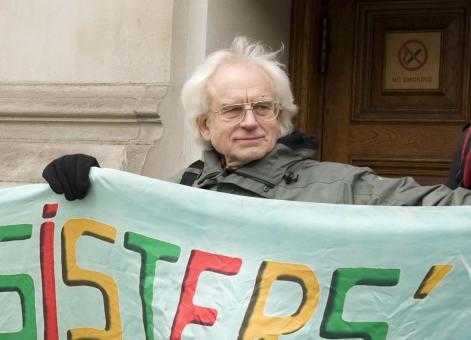
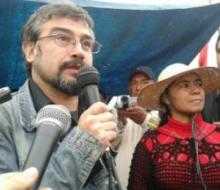
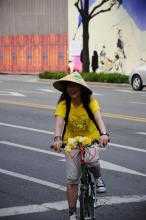
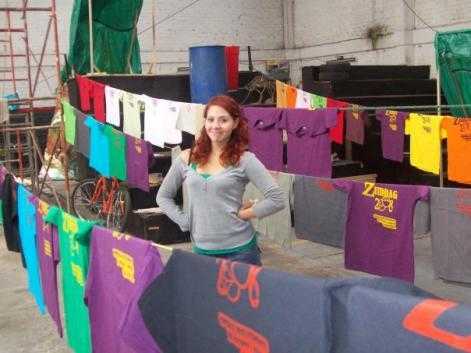
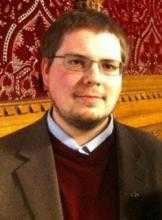

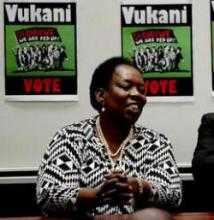


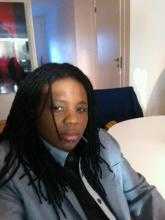




Add new comment